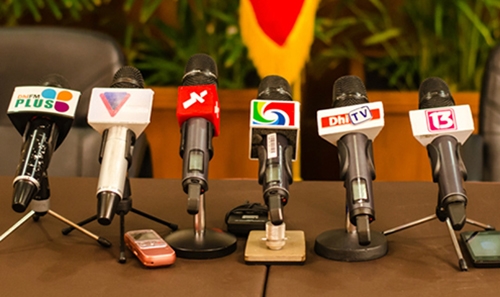Maldives police arrest 16 independent journalists
Malè: Maldives police arrested 16 independent journalists on Sunday while breaking up a demonstration against an alleged crackdown on freedom of speech in the politically troubled nation, private media outlets reported.
Police used pepper spray and roughed up reporters who were staging a sit-in protest outside President Abdulla Yameen's office in the capital Male, according to several outlets including the Maldives Independent website.
The protest was aimed at forcing the government to withdraw its draft criminal defamation bill, which protesters fear will be used against private media as well as political opponents of the government.
Demonstrators were also attempting to pressure authorities to investigate the whereabouts of a reporter who disappeared in mysterious circumstances, and were denouncing a court decision to temporarily close a newspaper over an ownership dispute.
Ongoing political unrest in the Maldives, a nation of 1,192 tiny coral islands, has dented its image as a peaceful paradise for well-heeled honeymooners and upmarket tourists.
"The latest protest follows a series of moves by the government and the judiciary to restrict free speech and media freedom in the archipelago," a journalist from the Haveeru newspaper told AFP on condition of anonymity, adding that six of his colleagues had been detained.
The Maldives Independent said five of its journalists were arrested, while three taking part in the protest were pepper-sprayed at close range and had to be taken to hospital. Private TV stations also said five of their reporters had been arrested.
The state controls the main radio and TV stations but not the newspapers. There was no immediate comment from the Maldivian police.
Western leaders have said there are worrying questions about freedom of speech, rule of law and the government's commitment to democracy in the nation of 340,000 Sunni Muslims.
Many opposition political leaders have either been jailed or forced into exile by Yameen's government, which faces mounting international criticism over its treatment of dissidents.
Political unrest has escalated since the toppling four years ago of the country's first democratically elected leader, Mohamed Nasheed, in what he claimed was a coup.
Nasheed, whose conviction and jailing last year on terror-related charges has been widely criticised, is now in the UK for urgent medical treatment after being given prison leave.
Related Posts

